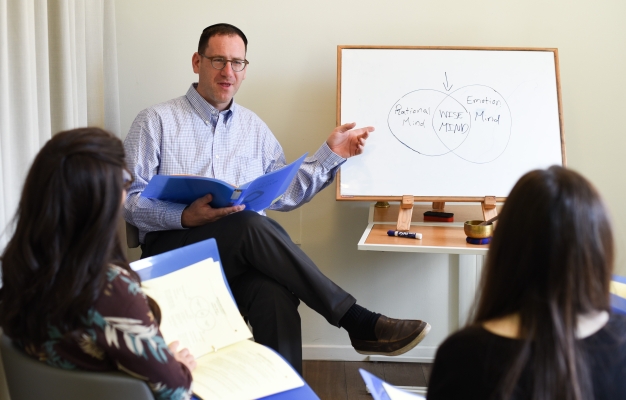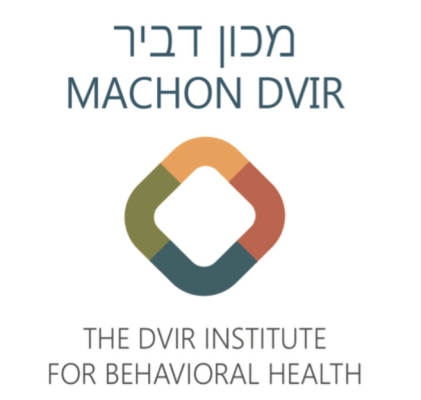Mental Health Care for Anglos
... in the center of the country
Around a decade ago, fellow mental health practitioners Dr. Shmuel Harris, then head of psychiatric services at Hadassah Mt. Scopus Hospital, and Dr. Tzachi Fried, a clinical psychologist in private practice, found themselves collaborating on a number of complex and high-risk cases while treating English speaking patients. As olim – Dr. Harris from Australia and Dr. Fried from the US – they were frustrated by the lack of intensive therapeutic resources for Anglos and saw a need to fill the gap.
In 2016 they formed Machon Dvir, The Dvir Institute for Behavioral Health, in Jerusalem and Beit Shemesh, with a goal of providing high level mental health services for the English-speaking community in Israel. They chose Dialectical Behavior Therapy, or DBT, as their primary treatment model for its effectiveness with high-risk and complex cases, and hired a team of psychiatrists, psychologists, and social workers - all English-speaking olim. The team works with adults, older adolescents, university, and gap year students, offering treatment for impulsive, addictive, and self-harming behaviors, suicidal thoughts, and dysregulated eating, as well as diagnoses of borderline personality disorder, complex-PTSD, depression, anxiety, eating disorders, and OCD.
Machon Dvir opened its Raanana practice in November 2022, allowing them to bring their services to the center of the country. In keeping with their mission of community outreach and education, local Raanana rabbis, educators and community mental health professionals were invited to meet the team and discuss ways of recognizing and dealing with mental health struggles within the community.
What is Dialectical Behavior Therapy?
DBT is a form of therapy that aims to help individuals act effectively when faced with overwhelming emotions: The word behavior in the name of the treatment refers to the focus on helping patients identify and change the behaviors that have a direct impact on their emotions and quality of life. The word dialectical refers to working toward a sense of balance. For example, DBT teaches clients to understand and accept their emotional experiences even as they work toward change, and to validate the perspective of others even as they work toward asserting themselves.
DBT teaches 4 main sets of skills
Mindfulness: The objective of mindfulness is awareness. Individuals with emotion dysregulation are taught to pay close attention to their inner thoughts, feelings, and sensations, as well as outer environmental cues. Learning to effectively shift attention toward and away from various stimuli provides building blocks for recognizing and effectively adjusting emotions, thoughts, and behavior.
Emotion Regulation: Learning the behavioral steps and thought processes needed to stay away from experiences/situations that trigger emotional instability, as well as learning how to increase engagement in healthy experiences that promote stability and life satisfaction.
Distress Tolerance: Learning how to get through periods of unavoidable, intense, and negative emotions without losing control. Tolerance of high distress levels involves acceptance, relaxation, distraction, and problem-solving strategies.
Interpersonal Effectiveness: These skills help guide healthy interpersonal interactions and facilitate healthy relationships rather than destructive ones.
Commitment to Community
Both Dr. Harris and Dr. Fried are actively engaged in outreach, mental health education and awareness, and advocacy for the Anglo community in Israel. They provide DBT training for therapists, address relevant issues with articles in The Jerusalem Post and Times of Israel, participate in annual conferences such as Get Help Israel, and helped organize Jerusalem's first-ever Mental Health Fair for English Speakers. That event, which was designed to remove the stigma of mental health (particularly among the Haredi sector) and present available options for English-speakers, drew a crowd of more than 2,500 people. Dr. Harris, together with Rabbi Yoni Rosensweig, co-authored Nafshi B'Sheelati, a practical guide addressing Halachic issues across the mental health spectrum. The book is currently being translated into English and will be available at the end of the year.
Intensive Outpatient Therapy: A commitment to care
In addition to individual therapy, Machon Dvir's Raanana practice offers an Intensive Outpatient Program (IOP) in English, the first of its kind in Israel. The treatment is geared to individuals who require a higher level of care than weekly therapy visits, and who may not qualify for a residential inpatient program. While more intensive mental health services are available in Israel, they are mostly provided in Hebrew. The IOP is suited for those who may not be fluent enough in Hebrew to participate in those programs.
IOP participants meet three times a week for a 12-week period, from 9 am to 3 pm. The basis of the program is DBT skills training, which teaches participants how to regulate their emotions, and makes up for a good part of the day. Each day also includes a mindfulness practice and a movement group, such as yoga, creative arts or DBT-informed kickboxing. This helps build self efficacy, self-esteem and trauma recovery. There are also process-oriented groups in which participants can openly discuss issues and help them stay focused on their goals. Medication management is provided as needed.
The program is currently open to women (over age 18) who suffer from emotion dysregulation, personality disorders, and other behavioral health issues that challenge day to day functioning. A number of successful "graduates" have completed the program to date.
Machon Dvir's Raanana office offers a calming and private setting with easy access to public transportation and parking. The IOP, under the direction of Dr. Tzachi Fried, PhD, and Dr. Sarah Reinstein, MD, takes place on Sundays, Tuesdays and Thursdays from 9:30 am to 3:30 pm. The program is limited to nine female participants. Intakes will be processed monthly on a rolling basis.
For more information, please contact Machon Dvir at 09 777 2527 or visit www.machondvir.org









Comments